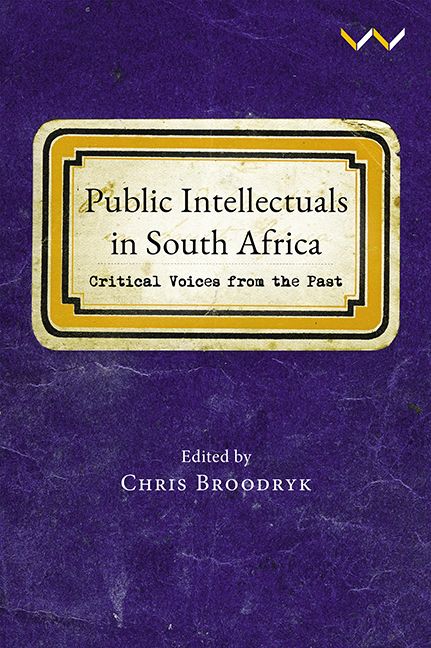Book contents
- Frontmatter
- Contents
- Acknowledgements
- Introduction: The Prismatic Nature of Public Intellectualism
- Chapter 1 Recalibrating the Deep History of Intellectual Thought in the KwaZulu-Natal Region
- Chapter 2 Elijah Makiwane and Early Black South African Public Intellectualism
- Chapter 3 Black Art Criticism in The Bantu World during the 1930s
- Chapter 4 In Conversation with the Nation: Sowetan’s Maverick Editor Aggrey Klaaste
- Chapter 5 William Pretorius and the Public Intellectualism of the Film Critic
- Chapter 6 Cultural Policy and the Arts: Mewa Ramgobin and Public Dialogue
- Chapter 7 ‘Kaalgat Critique’: The Public Intellectualism of Koos Roets as Afrikaans Satirist
- Chapter 8 The Public Intellectualism of Artivist Mandisi Sindo
- Chapter 9 The Janus-Faced Public Intellectual: Dr Thomas Duncan Greenlees at the Institute for Imbecile Children, 1895–1907
- Index
Chapter 2 - Elijah Makiwane and Early Black South African PublicIntellectualism
Published online by Cambridge University Press: 16 July 2022
- Frontmatter
- Contents
- Acknowledgements
- Introduction: The Prismatic Nature of Public Intellectualism
- Chapter 1 Recalibrating the Deep History of Intellectual Thought in the KwaZulu-Natal Region
- Chapter 2 Elijah Makiwane and Early Black South African Public Intellectualism
- Chapter 3 Black Art Criticism in The Bantu World during the 1930s
- Chapter 4 In Conversation with the Nation: Sowetan’s Maverick Editor Aggrey Klaaste
- Chapter 5 William Pretorius and the Public Intellectualism of the Film Critic
- Chapter 6 Cultural Policy and the Arts: Mewa Ramgobin and Public Dialogue
- Chapter 7 ‘Kaalgat Critique’: The Public Intellectualism of Koos Roets as Afrikaans Satirist
- Chapter 8 The Public Intellectualism of Artivist Mandisi Sindo
- Chapter 9 The Janus-Faced Public Intellectual: Dr Thomas Duncan Greenlees at the Institute for Imbecile Children, 1895–1907
- Index
Summary
This chapter explores the life and work of Reverend Elijah Makiwane (1850–1928). He was born in Sheshegu, Alice, in the Cape Colony (whatis now the Eastern Cape), one of three children. In 1858 his parents becamepart of the Wesleyan Methodist Society. He attended elementary school inNcerha village, under the guidance of a Wesleyan teacher, Joseph Mjila.Subsequently, he went on to study at Nxukhwebe (Healdtown) High School inFort Beaufort. In 1865, at the age of 15, he enrolled at Lovedale College.The college introduced him to studies in literature, philosophy, languagesand divinity, which were of a superior quality as there was no materialdifference between the college's curriculum and the theologicalcurriculum offered in Scotland.
Mweli Skota maintains that Makiwane gradually mastered his lessons until hebecame the second of his theological class (after Pambani Mzimba) to qualifyfor the ministry of the Free Church. Lovedale offered him an enablingenvironment that shaped him into the man he became. In 1871, the LovedaleEducation Board awarded him a special meritorious award called theCertificate of Honourable Mention, which acknowledged his good work andpositive influence on others.
During the ten years he spent at Lovedale, Makiwane became an intern inpositions that were prominent among the school elite. In March 1867, in hissecond year of study, he was appointed as an assistant teacher to teachjunior classes. Between 1875 and 1877, he was appointed to teach first-yearTheology students. In November 1872 when the telegraph office opened, he wasin charge of its operations for a year. In 1875, he qualified and waslicensed as a minister of the Free Church of Scotland.
Makiwane was a pioneer of modern journalism among black people in SouthAfrica and a prominent contributor to public discourse. He is known for hisquest for education and knowledge production, his engagement with raceconsciousness and his championing of cultural, political and spiritualidentities. However, Makiwane and many others who formed the early Africanintellectual movement are often left out of the array of South Africanhistories and the post-apartheid memorial complexes. The African NationalCongress (ANC) historiography eliminates many early histories and insteadfocuses on the more recent past and aspects of history from the second halfof the twentieth century, framed by the Mandela mythology.
Information
- Type
- Chapter
- Information
- Public Intellectuals in South AfricaCritical Voices from the Past, pp. 44 - 67Publisher: Wits University PressPrint publication year: 2021
